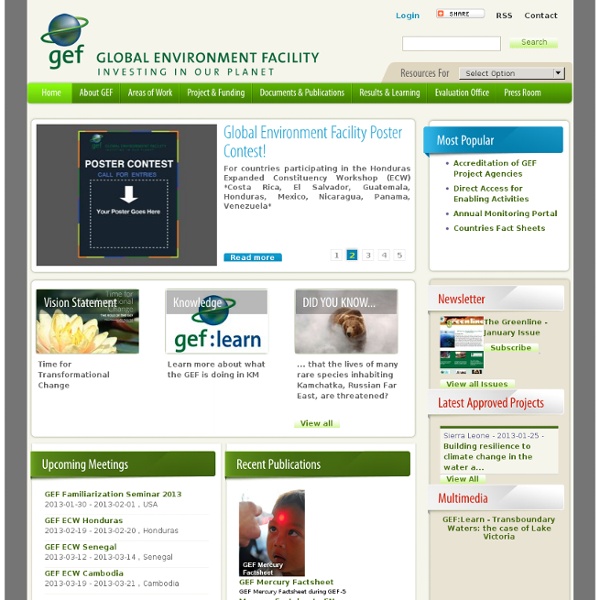



WMO (World Meteorological Organization) GCOS Home Page Adrian Simmons handing over GCOS Steering Comittee Chair to Stephen Briggs Adrian Simmons, who recently retired from the European Centre for Medium-Range Weather Forecasts (ECMWF), has completed his four-year term as Chairman of the GCOS Steering Committee. Stephen Briggs (ESA) has accepted to chair the GCOS Steering Committee with effect from 1 March 2014. Carolin Richter (centre), Director of the GCOS Secretariat, met Adrian (left) and Stephen (right) for a brief hand-over ceremony at the European Centre for Space Applications and Telecommunications (ECSAT), based at the Harwell Science, Innovation and Business Campus in Oxfordshire, UK, on 3 April 2014. GCOS Reports by National Climate Observing Systems Four reports have been published so far: GCOS at COP 19 The GCOS Statement for COP 19 of UNFCCC can be found here: The ESA Satellite Soil Moisture Validation and Application Workshop The meeting report can be found here: GCOS promotes the work of GOSIC
UN Statistics The Millennium Development Goals Report 2013 was launched in Geneva by the Secretary-General on 1 July 2013. The report presents the yearly assessment of global and regional progress towards the MDGs. With the deadline for the MDGs on the horizon, this year's report examines where the targets have been met and where redoubled efforts are needed urgently to accelerate the progress. It also reveals that our attention needs to focus on disparities across geographical areas and population groups within countries. The report is based on comprehensive official statistics compiled by the Inter-Agency and Expert Group on MDG indicators led by the Statistics Division of the Department of Economic and Social Affairs. The report is available in all UN languages. The Statistical Annex of the report can be viewed here.
INCR (Investor Network on Climate Risk (Ceres)) The Investor Network on Climate Risk (INCR) is a network of more than 119 institutional investors representing more than $14 trillion in assets committed to addressing climate change and other key sustainability risks, while building low-carbon investment opportunities. INCR includes the largest institutional investors in North America as well as leading religious and labor funds, asset managers and socially responsible investment funds. In 2013, INCR turned 10 years old, celebrating a decade of investor action on climate risk. Learn about INCR's major achievements over the first 10 years. INCR members are: Changing their practices throughout the investment value chain to address climate and sustainability risks and opportunities. Engaging with companies in their portfolios on climate and sustainability issues. Advocating for strong climate and energy policies at the international, federal, regional and state levels. Corporate Engagement Read more about corporate engagement...
IIGCC (Institutional Investor Group on Climate Change) IGCC (Investor Group on Climate Change) LOHAS (Lifestyle of Health and Sustainability) Eurosif Ceres ASrIA Stockholm Convention (POPs) Schedule and registration Objectives Increasing Parties’ knowledge on existing guidance to update NIPs, Parties’ understanding of HBCD and other POP-PBDEs listed, and Parties’ capacity to make inventories of POP-PBDEs, as part of the NIP update. Contents Introduction - 5 min Presentations Understanding HBCD and POPs-PBDEs - 10 min. Target group Stockholm Convention Official Contact Points, Basel Convention Competent Authorities, Rotteredam Convention DNAs and National Focal Points, national experts involved in the review and update of the NIPs at the national level, especially in the undertaking of the new POPs inventories, Basel Convention Small Intersessional Working Group on new POPs waste, POPRC members and observers, CRC members and observers. Background Parties have the obligation to update their NIP and to transmit it to the COP within two years of the date on which the amendment entered into force for them.
SFI (Sustainable Forestry Initiative) WWF